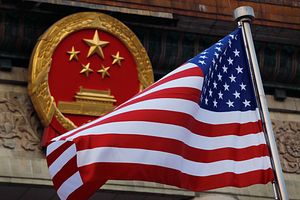For the first time in a survey conducted on the question since 2006, a majority of U.S. respondents have said that they see the United States and China as “mostly rivals.” The Chicago Council on Global Affairs, a U.S. think tank, released the results of polling it conducted in February 2019 on the question, finding that 63 percent of all respondents rated the two powers as rivals.
In the past, results of the survey had found that across some political affiliations, Americans were willing to rate China and the United States as rivals by a slim majority. For instance, in March 2018, 51 percent of Democrats and 50 percent of Republican respondents answered “mostly rivals” to the question, “At present, are the following countries mostly rivals or mostly partners?”
That year, only 48 percent of independent respondents — those without a self-reported partisan identity — said the same. This year, across partisan lines and independents, the view is quite different: 65 percent of Republican respondents, 64 percent of Democratic respondents, and 61 percent of independents agreed that the two countries were mostly rivals.
The results reflect a hardening perception toward China among the U.S. public, mirroring shifting views among policymakers and foreign policy thinkers across partisan lines as well. The finding also comes in the aftermath of the Trump administration, in its December 2017 National Security Strategy, recognizing China, along with Russia, as a great power competitor.
Earlier this month, the Trump administration’s Indo-Pacific Strategy Report also called China “revisionist” power in Asia. The Chicago Council survey results show that one of the most significant concerns for all Americans about the U.S.-China relationship is the ongoing trade war between the two countries. Republicans, however, were less concerned about the negative consequences of a trade war on the U.S. economy.
As the report notes, however, “concerns about a potential trade war between the United States and China were already widespread before this most recent escalation.” The latest results may suggest that after months of trade tensions, including multiple rounds of escalating tariffs, Americans perceive the rivalry between the United States and China to have set in for the long haul.
The Chicago Council’s survey findings are tempered, however, by a view that most Americans, including “opinion leaders” and the general public, do not see the trade war with China as a “critical threat to the United States.”
This weekend, U.S. President Donald J. Trump and Chinese President Xi Jinping are set to have their first face-to-face meeting since the breakdown of trade negotiations in May.

































